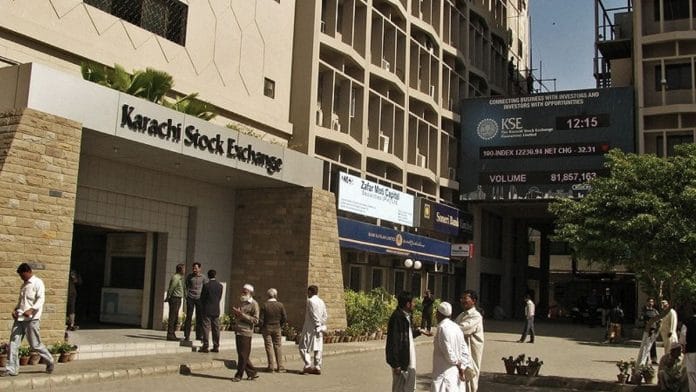New Delhi: Two days after the S&P Global Ratings upgraded Pakistan’s sovereign credit rating to ‘B-’ from ‘CCC+’, its first upgrade in three years, experts are seeing this as “a turning point for Pakistan’s credit story”. The risk of a default is well in the past, according to them.
Inflation has dropped to just 1.5 per cent in a decade. The Karachi Stock Exchange surged over 84 per cent this year. And for the first time in years, foreign investors are cautiously returning, buying short-term government debt.
“What’s different this time is that policymakers are keen to take a slow and steady approach when it comes to unlocking growth, primarily because the psychological impact of the previous crisis has made them realise that the room for mistakes by trying to grow too much in too little a period of time is virtually non-existent,” Pakistani economist Uzair Younus, Principal at The Asia Group, a strategic consulting firm based in Washington, DC, said.
S&P said the upgrade reflects improved public finances and foreign reserves, helped by support from the International Monetary Fund (IMF).
“The stable outlook reflects our expectations that continued economic recovery and government efforts to enhance revenue will stabilize fiscal and debt metrics,” it added.
Also read: What’s behind Pakistan’s solar energy push—China is just one factor
Room for reforms remains
A better credit rating makes Pakistan less risky for investors, which means it can now raise money more easily and at lower interest rates in global bond markets. Countries with better credit ratings pay lower interest on these loans. Previously, with a lower ‘CCC+’ rating, Pakistan had to offer high interest rates to attract investors because of the high risk of default. The new ‘B-‘ rating means investors now see Pakistan as more stable and less likely to miss payments.
Economic growth is also picking up.
“Firstly, it shows that the risk of sovereign default, which was quite omnipotent just a couple of years ago, is in the past. Secondly, it lowers the cost of borrowing and opens the options of raising money from the global markets. Thirdly, it’s a validation of the improvement in economic indicators and signals third-party confidence in the turnaround. All of this happened despite the risk of an armed conflict with India, which shows that the markets are not worried about it,” Ali Farid Khwaja, chairman at KT Bank Pakistan, told ThePrint.
According to experts at Bloomberg, Pakistan’s economy will grow by 4.1 per cent in the current financial year, up from just 2.1 per cent last year. The central bank of the country has cut the key interest rate by half—from 22 per cent to 11 per cent, to encourage borrowing and investment.
On top of this, the IMF has lowered the interest on the loans it gives Pakistan, making it cheaper for the country to borrow.
Experts say the recent upgrade was expected, given that Pakistan has outperformed IMF targets for fiscal deficit management as well as foreign exchange reserve growth.
“In addition, the recent budget was aligned with the IMF program as well, further bolstering confidence. As Pakistan’s economy recovers from the recent crisis and interest rates come down, economic growth is likely to rebound,” Younus added.
While these signs are encouraging, deeper problems remain. Pakistan’s economy is still stuck in a long-standing investment crisis. The country continues to rely heavily on consumption, while investment remains dangerously low.
With a better credit rating and stronger economic signals, Pakistan may seem to be back on track. But unless it tackles the root problems of low investment and a broken tax system, the current gains will not last.
(Edited by Ratan Priya)






